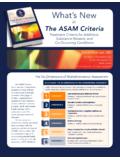Transcription of Dual Diagnosis Treatment Team - RCPA Annual Conference
1 dual Diagnosis Treatment team (DDTT)One Individual at a TimeConfidential -NHS Human Services, Inc. -Not for ReproductionObjectives To gain an overall understanding of: The structure of the DDTT model The dynamics of the team approach The effectiveness of this model and review recent outcomes The use of care coordination in facilitating high quality care How to create and evaluate a care coordination planConfidential -NHS Human Services, Inc. -Not for ReproductionWhat is a dual Diagnosis Treatment team ?Confidential -NHS Human Services, Inc. -Not for ReproductionWhat is DDTT? dual Diagnosis Treatment team (DDTT) is recovery oriented: Diagnosis of mental illness and IDD team approach to service coordination and Treatment Person-centered, holistic approach Community-based Focus is on skill transfer Providers of care coordination for consumers, supports and Treatment entitiesConfidential -NHS Human Services, Inc.
2 -Not for ReproductionOrigin of the DDTT IndividualBHARP CountiesCommunityCare NHSL ocal County MH/MR EntitiesConfidential -NHS Human Services, Inc. -Not for Reproduction $357,000 164 Referrals ErieCrawfordWarrenBedfordSomersetHunting tonFultonFayetteGreeneWashingtonFranklin AdamsCumberlandWestmorelandBlairCambriaP erryYorkLancasterDauphinLebanonChesterBe rksIndianaArmstrongAlleghenyButlerClearf ieldCentreMifflinBeaverLawrenceJefferson MercerVenangoClarionForestMcKeanElkPotte rTiogaCameronClintonLycomingBradfordJuni ataUnionSnyderSchuylkillLehighMontgomery DelawareBucksNorthamptonMontourSullivanC olumbiaLuzerneSusquehannaWyomingCarbonMo nroeLackawannaPikeWayneNorthumberlandCre eksideWoodland CenterHigh PointBradford-SullivanYork-AdamsLehigh ValleyNEPAP ittsburgh RegionCanal WaysJRCNHS F/F CenterCapital RegionSusquehannaPocono MountainBerksSchuylkillTwin Lakes/BlueSpruceMontgomeryLancasterCambr ian HillsDelawareDDTT Director.
3 Rebecca DempseyDDTT Director: Michelle Hetrick, DDTT Director: Samantha StitzelDDTT Director: Maria KohanDDTT Director: Nancy HamiltonDDTT Director: Gerardo GrassoDDTT Director: Elizabeth MooreDDTT Director: Alison BergerConfidential -NHS Human Services, Inc. -Not for ReproductionNHS DDTT Service Divisional (Service Line) Structure supports integrated approach Collaboration between Clinical and Operational leadership across the Behavioral Health and Intellectual and Developmental Disabilities divisions Intensive development phase Ongoing monitoring and review of service deliveryConfidential -NHS Human Services, Inc. -Not for ReproductionDDTT Staff Psychiatrist Psychiatric Consultants Certified Registered Nurse Practitioner Registered Nurse Pharmacist Consultant Director Behavior Specialist Recovery Coordinators Administrative AssistantConfidential -NHS Human Services, Inc.
4 -Not for ReproductionDual Diagnosis Treatment Focuses on: Continuity of care Hospital diversion Service and care coordination Specialized staff education and training Enhancing the individual s support networkConcepts based on: Assertive Outreach Mobile Treatment Teams Continuous Treatment Teams Person Centered Orientation Holistic ApproachConfidential -NHS Human Services, Inc. -Not for Reproduction A team approach Services in natural environment A small caseload of 14-22 individuals* Extended team 30 DDTT of Allegheny Time-limited services (12-18 months) A shared caseload Flexible service delivery Fixed point of responsibility Crisis management available 24 hours a day, 7 days a week Care coordination with individuals and their supports (personal and professional)Characterization of DDTTC onfidential -NHS Human Services, Inc.
5 -Not for ReproductionAttention to Individuals Needs DDTT staff work closely with individuals to develop plans to help facilitate their recovery An average of three face-to-face contacts per week Maintain open availability for updates and ongoing collaboration for coordination of care Communication through morning meeting structure As individuals needs change, the team adapts immediatelyConfidential -NHS Human Services, Inc. -Not for ReproductionInnovative Treatment Strategies: Pharmacogenomics& DDTT NHS DDTT is partnering with AssurexHealth Inc. to provide GeneSighttesting Analyzes genes within an individual s DNA to evaluate metabolism and responses to medications Provides the prescriber with valuable information when considering psychiatric medicationsConfidential -NHS Human Services, Inc.
6 -Not for ReproductionShort-Term Service Services will be provided for an individual over a 12-18 month period in various phases:Assessment .. Transition .. Discharge planning begins on day one Brief service periodConfidential -NHS Human Services, Inc. -Not for ReproductionAdmission Criteria 18 years of age or older Major psychiatric disorder Intellectual Developmental Disability (IDD) Frequent crisis services and at least one psychiatric hospitalization within the last year At risk of losing current community housing/support At risk of placement in a criminal detention setting Requires transitional services back to the community from a higher level of careConfidential -NHS Human Services, Inc. -Not for ReproductionSupervisionConfidential -NHS Human Services, Inc. -Not for ReproductionDDTT: ARecap Explicit admission criteria Small caseload of 14 to 22* individuals 24-hour coverage Responsible for coordination of care with existing and new providers Delivery of direct Treatment services Time-limited services: 12 to 18 months*Allegheny team has an enhanced staffing compliment to accommodate a larger caseload Confidential -NHS Human Services, Inc.
7 -Not for ReproductionDDTTC ycle of CareConfidential -NHS Human Services, Inc. -Not for ReproductionDDTT LifecycleAssessmentStabilizationTreatmen tTransitionConfidential -NHS Human Services, Inc. -Not for ReproductionReferral Referral criteria Interagency MeetingConfidential -NHS Human Services, Inc. -Not for ReproductionAdmission Responsibilities and Documentation Complete intake the day of interagency meeting Complete initial Treatment Plan Complete Personal Safety Plan Develop communication strategyConfidential -NHS Human Services, Inc. -Not for ReproductionComprehensive Assessment Multimodal in design Bio-psychosocial Typically includes Functional Behavior Assessment Medical Assessment Sensory Evaluation Trauma Screening Social Assessment and Timeline Psychiatric Evaluation Adaptive FunctioningConfidential -NHS Human Services, Inc.
8 -Not for ReproductionIntegrated Recovery Treatment Plan Person centered outcomes Long-term and short-term objectives Actions steps Addresses specific aspects and complexities of individual Includes the Personal Safety Plan Resource GuideConfidential -NHS Human Services, Inc. -Not for ReproductionContinuous Treatment Planning Evaluates the individual s needs and effectiveness of Treatment Morning meetings three times per week Treatment team /planning meetings every 30 days Update Treatment Plan every 120 days Update psychiatric evaluation every 6 monthsConfidential -NHS Human Services, Inc. -Not for ReproductionDischarge Short-term service is 12 to 18 months Discharge Summary TimelineConfidential -NHS Human Services, Inc. -Not for ReproductionBrief Service Period Available within 1 year of discharge If relapse of original behaviors Life event Trauma Change of supports Four weeks Review of original assessment and Integrated Recovery Treatment PlanConfidential -NHS Human Services, Inc.
9 -Not for ReproductionDDTTQ uality Assessment and OutcomesConfidential -NHS Human Services, Inc. -Not for ReproductionChallenges Large geographic area Travel time Level of trauma with this population Lack of specialized Treatment providers throughout PA Lack of stabilization options/unique need of this population Co-morbidity issues that effect this group Building dual Diagnosis capacity in the community Confidential -NHS Human Services, Inc. -Not for ReproductionOutcome ExpectationsKey Performance Indicators Reduction in: ER visits for behavioral health needs Inpatient hospitalizations Readmissions (inpatient stays within 30 days of prior stay) Number of ER presentations and inpatient hospitalizations Number of incarcerations and days incarcerated Number of calls to crisis services and law enforcement Increase in: Length of time an individual maintains housing Acquisition of independent living skills Number of individuals engaged in meaningful day activities Connections to and support from natural supports Evidence of satisfaction with program deliveryConfidential -NHS Human Services, Inc.
10 -Not for ReproductionOutcomes245116129 Total Individuals ServedCurrently in CareDischarged from CareIndividuals Served through July 31st, 2016 Confidential -NHS Human Services, Inc. -Not for ReproductionOutcomes64%4%10%5%2%2%5%2%1% 3%1%1%Discharge DispositionSuccessful: Met all Highest Prioritized Treatment Goals: 64%Individual Admitted to a Higher Level of Care at Discharge: 4%Individual Disengaged from Treatment / Refused further care: 10% team Disengaged from Treatment : Family: 5% team Disengaged from Treatment : Residential Provider: 2% team Disengaged from Treatment : Other Provider: 2%Individual Relocated out of the DDTT Coverage Area: 5%Case Transfer to Another DDTT: 2%Incarcerated at Discharge: 1%Loss of Insurance Coverage: 3%Death: 1%Medically Unstable: 1%Confidential -NHS Human Services, Inc.






